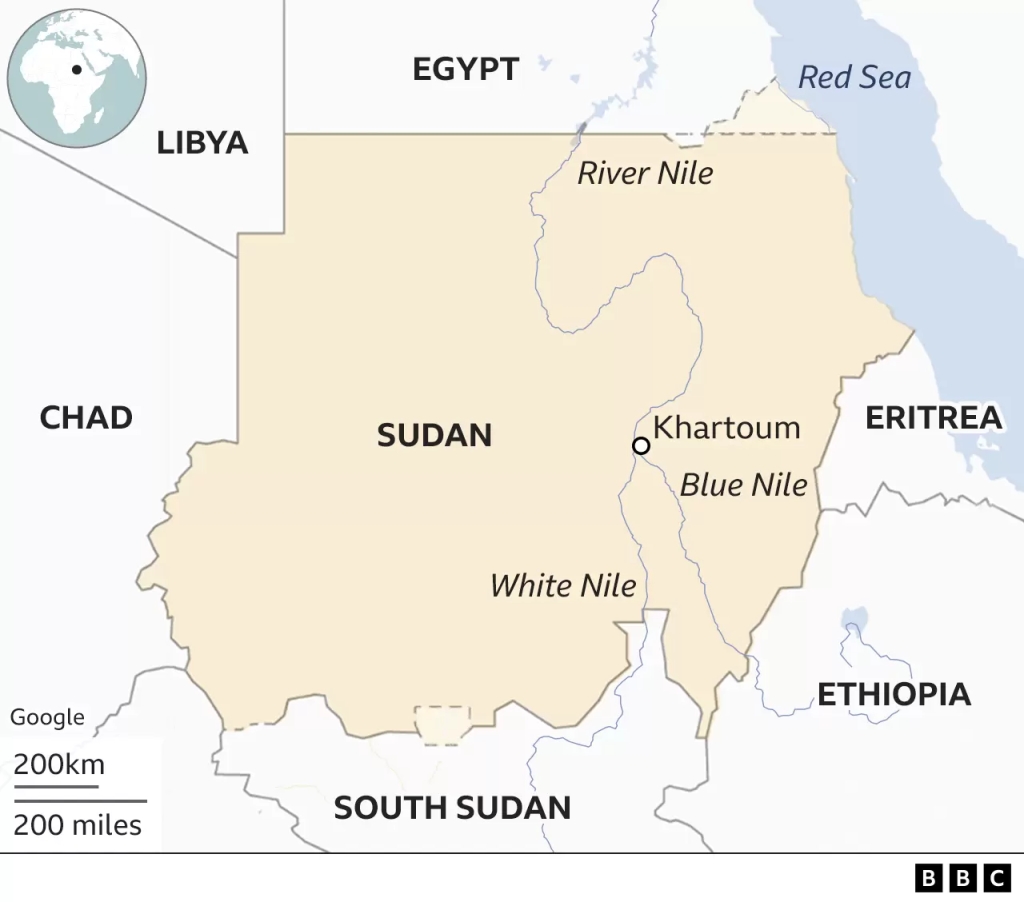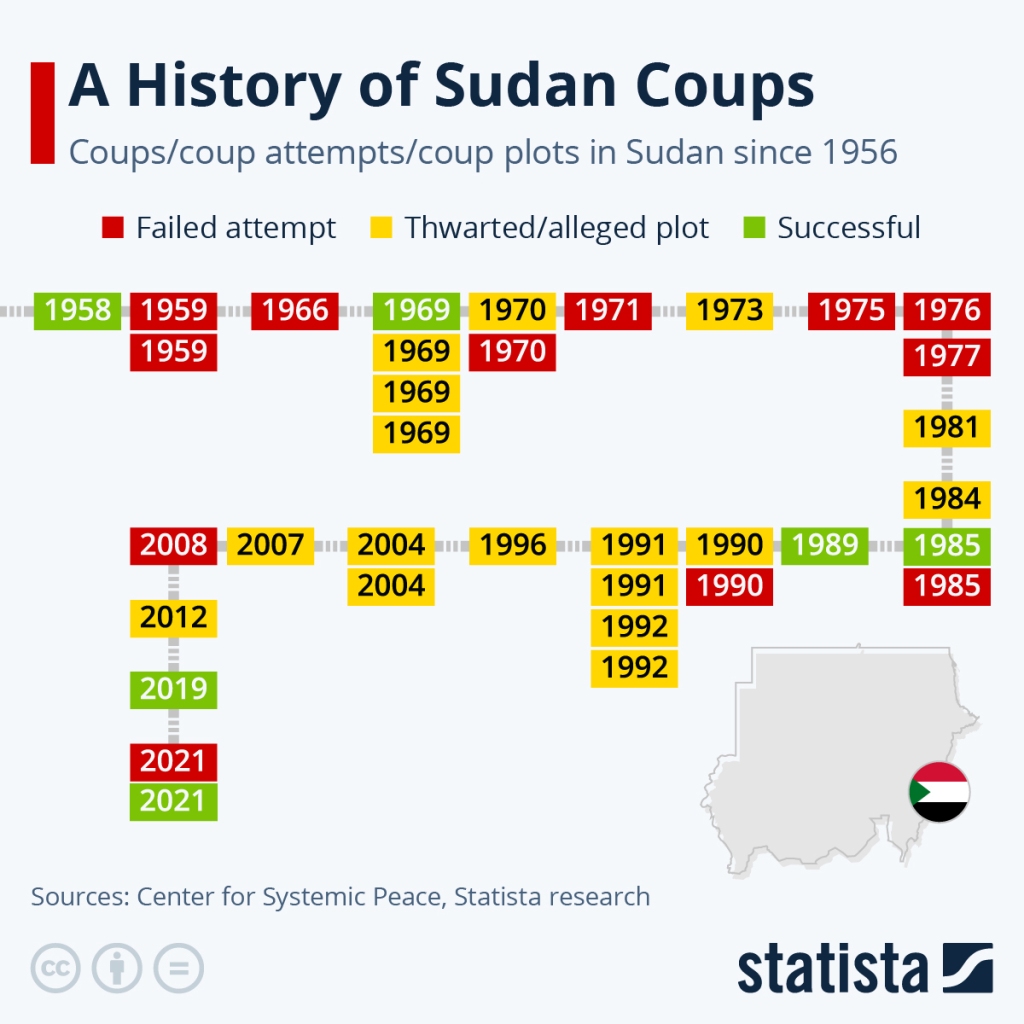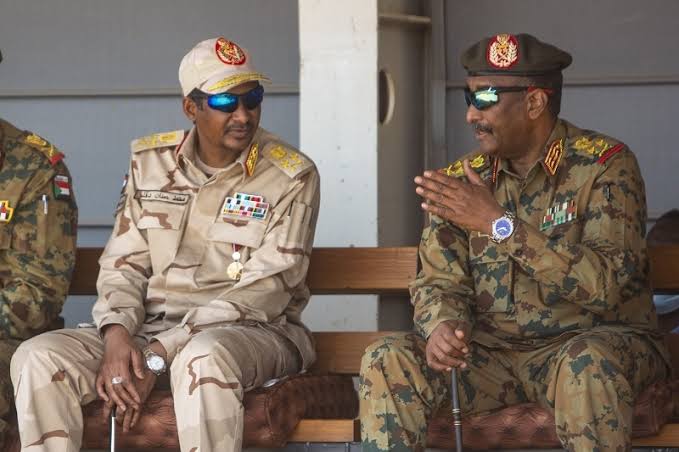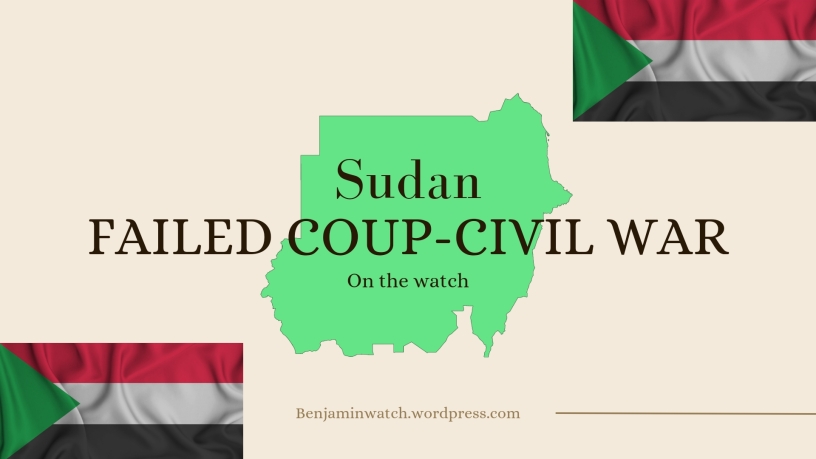For a while now, I have wanted to have my say on the Sudan crisis of 2023. Where I come from we have ways of referring to Sudan, and with a lot of disdain, we sometimes call it the other Sudan. When Sudan was Africa’s largest country, it developed a bad reputation amongst its neighbors. In Uganda, it backed the LRA and the ADF as it caused mayhem in the oil region, it had a border issue with Ethiopia and the Nile water was always a problem. People with black skin hate Sudan for its wars with the southern part from 1955 to 1972 and 1983 to 2004 leading to the Comprehensive Peace Accord CPA in 2005 that led to the independence of South Sudan.
In the past, we have seen Darfur woes spill into Chad. There is a war economy in Chad, Central African Republic, and Libya. Sudan borders Tigray and Eritrea is always in the mix. There has been a huge blame on the creation of South Sudan because of the oil fields that left the Sudan economy with no life.

On my watch I have held back from writing about Sudan because I find the country funny, it’s a joke and I am sad that I see it that way. The country has been independent for about 6 decades and in the first two decades they had 20 coup attempts but only 3 were successful then. Even history experts would find these statistics funny. Anyway in 6 decades they have had a total of 36 Coup attempts but only 6 have led to change of government. 36 include April 2023 which failed leading to a conflict that has spiralled into a civil war of sorts, hence this blog post.
When I wrote about the Nigerian elections in one of my rants I went ahead to talk about the upcoming polls on the continent for 2023 and Sudan was on the list. The military in Sudan was supposed to hand over power to civilians but Egypt was discouraging the path to democracy which would cause ripple effects in the region, Khartoum has for hundreds of years had connections to Cairo and it was once an outpost for the slave trade.
As the world was stopping to see Khartoum in the shadows of Omar al-Bashir who came through a coup in 1989 and stayed on for 3 decades and left through another coup in 2019, with scars of a genocide to the country the new viewpoint has faded into more than two coups one failing. The country loves coups explaining why on a few occasions tried to export them around the region.

Sudan is a special country, it’s an Arab country, it’s an African country, it’s a military country, it’s a Middle Eastern country, it’s a Nile basin country, and it’s an Islamist country that was once a safe haven for Osama Bin Laden and a number of international terrorists. Having a Red Sea coastline also makes it an international geopolitical player even if it has been isolated for the most part of the last 3 decades.
Every watcher of Africa thinks Khartoum city is among the future economic hubs of the continent and the city is an economic gateman for countries south. It accounts for more than 50% of the country’s economy and if the war doesn’t stop capital will flow out of the country through refugees. Khartoum is a typical African city with a population that is disconnected from the realities of the rest of the country for the most part until recently. The one million residents of the capital are referred to as the “community of the state” and they have enjoyed everything that is there to be enjoyed. For the first time, the social and economic Westland of Sudan is looking on as the military establishment takes on their minions the Janjaweed led by a gentleman nicknamed Hemedti who used to knock down men in Darfur with Toyota pickups on behalf of Omar al-Bashir leading to his summons to ICC.
The power struggle is between two men, the Head of the Sudanese Armed Forces (SAF) Lieutenant-General Abdel Fatah al-Burhan and the Head of the Rapid Support Forces (RSF) Mohamed Hamdan Dagalo aka Hemedti. The two teamed up to overthrow Bashir their boss, they went ahead and overpowered a coalition that was to prepare for elections and started their alliance of circumstance.

Al-Burhan is a modern Nassarists as he enjoys a lot of support from Egypt but they are reports of a dominant influence of the Muslim Brotherhood in the SAF who loathe the RSF on ideological grounds but that is far from being proven for now. In one form or another the Egyptian military is tied to the events in Sudan and Cairo has discouraged democracy in Khartoum.
Mohamed Hamdan Dagalo and his RSF have been referred to as not cultured by the community of the state but they have made headways on the international scene, Bashir sent them to Libya to help in the overthrow of Gadhafi and there they met CIA’s Khalifa Haftar who is heavily connected to France and Russia at the same time, the Janjaweed have also over the past few years evolved into a transnational mercenary enterprise that has made a lot of money in the Yemen crisis on the side of the Gulf Oil rich Kingdoms. In fact, the truce between Saudi Arabia and Iran brokered by China leading to the cooling of the war with the Houthis meant the Sudan militia was dormant, richer and with a lot of modern war experience as seen on the streets of Khartoum. As a private army, the RSF made friends with the Wagner Group over the Darfur gold mines.
On April 15th the RSF grew confident or most likely got the go-ahead from foreign stakeholders to go ahead and overthrow the SAF which failed but has dragged on for now a month and there is no end in sight at the moment. The RSF overran most of the SAF positions in Khartoum including the presidential palace and it has since held onto them, the fighting has further spread across the third-largest African country. It was an attempted coup that failed and now is a full-blown modern civil war, with civilians not taking sides this time since they have no interest in the dance of generals.
The UN Security Council led by Russia at the moment is largely silent and African leaders are more worried about negotiating peace between Moscow and Kyiv instead of having African Union sit down the RSF and SAF even if there is the threat of weapons flowing from Sudan to across the continent that will lead to new levels of armed crimes at all sorts of scales.
The scary bit of the war is how fast countries made sure their nationals, working and studying in Sudan left setting a Syria-like condition for a total all-out use of modern weapons. People have died and they continue to die by the day in their hundreds.
If only Bashir had not held on to power for 30 years I strongly believe it would have been a fairer story to tell.

The Politics of blaming Bashir Omar… Well, for me when a people are familiar with a culture of honour such as this, we are meant to respect their decisions as outsiders. And I love the way you put it, this time the civilian did not involve themselves. All I see is the heart of a power drunk generals committed to getting power by whatever means, I am only ashamed of the insincerity of the world, giving no ear to the Sudan crisis, and to the Christians largely hypocrite and puppets of the West, who went mute with Sudan but were all chanting Peace when Ukraine try disrespecting Russia, through the help of US.
LikeLiked by 1 person
The world has never really cared about Africa until it affects them
LikeLiked by 1 person
Another good rant.
LikeLiked by 1 person
When it comes to Africa all we can do is rant
LikeLiked by 1 person
Africa and it’s problems !! And then those hypocrites who pretend to care but indirectly facilitate war to get what they want!!
LikeLike